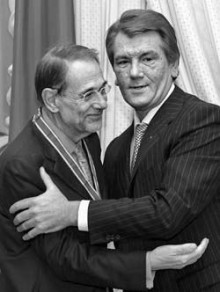President Viktor Yushchenko of Ukraine is displaying consistency and decisiveness in following the course of Ukraine’s European integration. This is confirmed by his latest statements, interviews, and initiatives that focus on how the Ukrainian man in the street can benefit from integration with the EU. The new presidential team is starting to present membership prospects through the prism of the human dimension.
The Presidential Administration insists that it is necessary to initial an agreement on a simplified visa regime and an affiliated agreement on readmission at the Ukraine-EU summit in Helsinki on Oct. 27. For the same reason the administration emphasizes that the Verkhovna Rada must not delay passing 16 laws that will enable Ukraine to join the WTO by the end of this year or in early 2007.
“Simplifying the visa regime with the EU countries is an efficient mechanism of our integration with Europe at the human level,” Oleksandr Chaly, the deputy head of foreign policy questions at the Presidential Secretariat, told journalists at a recent briefing. According to Chaly, the president’s position is that a delay in the dynamic of advancing these two agreements seriously affects the interests of the ordinary Ukrainian, who is the first to be affected by visa issues. Most citizens of EU countries are unanimous in their opinion that the biggest advantage of membership in the European community is open borders and freedom of movement.
The Ukrainian side has been insisting on signing a readmission agreement according to the Russian version, which envisages a three-year postponement of the agreement’s implementation. At the same time, the draft agreement on a simplified visa regime provides more favorable conditions for Ukraine than those indicated in the EU-Russia agreement.
“The European Commission is offering Ukraine a two-year postponement,” Chaly said, adding that the examination of these two agreements as a single package, as proposed by the EU, is a reality. “In politics, primarily in foreign policy, you need to take into account interests and the reality,” he pointed out. Chaly said this issue is being considered within a normal, legal, democratic process. The president is controlling it at all stages, and he will make the final decision on the eve of the summit.
The Day asked this Ukrainian official if the president will take another week to consider whether to initial these two agreements. “The president does not have a week to think. We have to inform the EU that we have accepted this decision because they need to do the same. I have no doubt that we will reach a positive solution to this question during the Oct. 27 Ukraine-EU summit,” replied Chaly, who added that right now it is only up to the government to decide about the ways in which it will carry out these agreements.
Ukraine’s accession to the WTO is another of the president’s pivotal foreign policy initiatives, which has everything to do with all Ukrainians. “For the Ukrainian man in the street WTO membership will mean lower prices for a wide range of goods thanks to increasing competition. That is why accession to the WTO will bring good results for ordinary Ukrainians,” Chaly said. But he also acknowledged that such a step will definitely cause problems for a number of Ukrainian industries that are uncompetitive or not ready for 100 percent competition.
Ukraine has already fulfilled the tariff obligations that it took on in the course of its WTO aspirations. “As a matter of fact, we are living in an 80 percent regime of WTO accession,” noted Chaly, adding that our young Ukrainian business, which is ready confidently to enter the civilized economic community, and primarily the EU, is the subject of certain discriminative restrictions because Ukraine does not belong to the WTO- antidumping and other procedures that do not allow Ukrainian enterprises to work properly in the countries to which they export their products.
“This is the very reason why every month that we delay our accession to the WTO results in far worse consequences than those we would have after joining this organization,” underlined the deputy head of the Presidential Secretariat. The president is holding consultations on this issue with political parties and the business elite, and Chaly is convinced that WTO- related laws will be supported by at least 226 votes in parliament.
It is clear that during the talks in Kyiv between Xavier Solana, European Union High Representative for Common Foreign and Security Policy, and the Ukrainian president and prime minister the parties discussed both the visa regime and the WTO. At a press conference with Solana and Prime Minister Viktor Yanukovych, the EU High Representative emphasized that the EU supports Ukraine’s course toward the WTO. He expressed the hope that Ukraine will be able to join this organization at the end of this year or early next year. “I very much want us to succeed and not fail,” he stressed.
Naturally, on the eve of the EU- Ukraine summit Brussels gave Kyiv clear signals. The Ukrainian president seems to have promised to do his utmost to initial the two agreements in the prepared version. In any case, there will be no better agreement on simplifying the visa regime. As they say in the West, the ball is now in the Ukrainian prime minister’s court, because it is up to the government to decide how to implement these agreements. This will be a durability test on the European integration issue for the anticrisis coalition to which representatives of Our Ukraine will likely lend its staunch support during the passage of the WTO-related laws.








